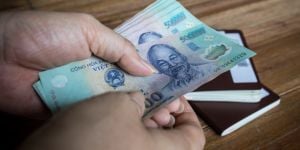BUYING GOLD IN VIETNAM
Last activity 21 May 2020 by THIGV
29385 Views
103 replies
Subscribe to the topic
Post new topic
I was born and raised in Saigon (then HCM city) as well. Left Vn when I was 18, but have since returned every year since late 90's to visit my family. My own personal experience of buying a property is limited as my wife and I only bought once in 2013. Actually, it was my wife who bought it as she's still a Vietnamese citizen and I'm not. Anyway, we paid for it in Vn dong.
I have friends and my brothers who recently bought properties and they all paid in Vn dong without exception. My wife's family recently sold their family home for a huge sum of money, and they were paid in dong. The period when people used gold for property transactions was over about at least 5 years ago. That's not to say that there's not people who still use gold to trade, but they are in the tiny minority.
Guess my experience differs than some of yours, no problems then.
Ciambella wrote:AFAIK (in the last almost 7 decades), Vietnamese have never listed the prices of their properties in gold, but the transactions were and are still conducted in both gold and currency. The currency portion is for official record.
Am I reading too much into your words or could the combined use of currency and gold to pay for houses be a means of tax avoidance for the sellers? The reason that I ask is that you state that "the currency portion is for official record." Also, could knowing that be the reason that the government is trying, however unsuccessfully, to move away from gold based real estate transactions?
THIGV wrote:Am I reading too much into your words or could the combined use of currency and gold to pay for houses be a means of tax avoidance for the sellers? The reason that I ask is that you state that "the currency portion is for official record." Also, could knowing that be the reason that the government is trying, however unsuccessfully, to move away from gold based real estate transactions?
I would answer yes to the first question but not with 100% certainty as I've never paid tax in Vietnam and knew little to nothing about it. I only heard tell that the recorded price was not always the price people paid although it's never too much lower than the price set by UBND.
I can't answer your last question right at this moment but I know from whom I can get the official answer. I'll have it this weekend.
Tax avoidance on the sale of property is huge. People dont put the real sale price to avoid tax, some even put it lower than the sellers original selling price. Buying with gold there is no bank account that can be checked to see what funds have changed hands. People also do this with bank accounts, Im surprised the government doesnt do more checking on transactions.
Too much misinformation on this forum. This is my last post. Enjoy your stay in Vn. I'm out!
Gold is used as under the table money to avoid taxes too. Declared value and then some gold.
Uncommon in the west for the average person to be handling it Day to day but very normal in these parts. My relatives who fled by boat in 75, like every refugee, had to pay about 6 taels of gold for the privilege of leaving their property and belongings behind.... I worked it out once as around 2000 USD in 1975 prices. FYI my parents went to live in the UK by plane and to join my sister under the Orderly Departure Program.
I digressed, but yeah my point is they love their gold in Vietnam. Have you seen how many gold shops there are on every street... I can only think of one place like it in the Uk and that’s a gold shop in Chinatown in Birmingham. Day to day trading and the use of Gold to buy houses is normal. Land, gold and USD because VND is hardly a stable currency to hold is it.
tdt-uae wrote:Too much misinformation on this forum. This is my last post. Enjoy your stay in Vn. I'm out!
You clearly have important knowledge about the elephant's tail, rear legs and butt.
Sadly, you are unwilling to engage in meaningful dialog with those who are experts in the front legs, tusks, the trunk, the eyes and the brain, which knows what happens to people who maintain your position without a willingness to be moved....
Another interesting thing I read about tax avoidance and how it has affected the Vietnamese landscape. Land taxes used to be caculated on the width of the house and not length or volume. I was always curious as to why houses were built narrow but long. 5m wide plots was the most tax efficient way to build a house.
phikachu wrote:...Day to day trading and the use of Gold to buy houses is normal. Land, gold and USD because VND is hardly a stable currency to hold is it.
Although it's been a good year for VNĐ vs USD; technically gaining (not counting inflation, of course):
tdt-uae wrote:Too much misinformation on this forum. This is my last post. Enjoy your stay in Vn. I'm out!
Thank you! 
tdt-uae wrote:Too much misinformation on this forum. This is my last post. Enjoy your stay in Vn. I'm out!
No problem, it's obvious you aren't open to others points of view. Even when the govt states there is a problem, you say their isn't.
As they say...ignorance is bliss.
Ciambella wrote:THIGV wrote:Am I reading too much into your words or could the combined use of currency and gold to pay for houses be a means of tax avoidance for the sellers? The reason that I ask is that you state that "the currency portion is for official record." Also, could knowing that be the reason that the government is trying, however unsuccessfully, to move away from gold based real estate transactions?
I would answer yes to the first question but not with 100% certainty as I've never paid tax in Vietnam and knew little to nothing about it. I only heard tell that the recorded price was not always the price people paid although it's never too much lower than the price set by UBND.
I can't answer your last question right at this moment but I know from whom I can get the official answer. I'll have it this weekend.
Ciambella is correct that the locals do lower the price on the contract to save a bit on taxes. However, all real estate transfer are subject to a 2% personal income tax on contract price. The contract price is usually in line with the government's assessment to avoid suspicion. At the end of the day, they are still paying taxes on the transfer.
In my opinion, I think people prefer gold part of the transaction as they are more bullish on the gold market compared to the VND currency market. As Colin mentioned, some people make out ahead if their timing is right and the gold market appreciates.
As for a foreigner, I would recommend not to fudge with the contract price as that will be an important supporting evidence when it comes to remit your money.
When I bought my apartment & went to make the final payment, we all....... me, Ms My, apartment owner(a director of company that built the block) , lawyer, lawyers assistant, selling agent) met at this Notary office think it was, then this almighty argument got up between my lawyer, the owner & the agent. I was in shock but sort of funny too. It got really bad with owner walking out of the office then coming back in then the lawyer walking out & then coming back in. The office was quite busy with people who I did not even know getting involved.
You wanna know what it was all about as I found out later.............cos the owner & the agent at that late stage had falsified the stated selling/buying price on the deed or what ever it was to avoid tax!! Once everything settled down it was explained to me that it was a normal thing to do in Vietnam but my lawyer did not seem to think so & was acting on my behalf so I suppose felt somehow they were cheating.
Since 2008 I have had built & paid for quite a few properties & land in Vietnam & never paid in gold although I have heard it could be done.
goodolboy wrote:You wanna know what it was all about as I found out later.............cos the owner & the agent at that late stage had falsified the stated selling/buying price on the deed or what ever it was to avoid tax!! Once everything settled down it was explained to me that it was a normal thing to do in Vietnam but my lawyer did not seem to think so & was acting on my behalf so I suppose felt somehow they were cheating.
Of course they were cheating and your lawyer was right. What they did was in effect push their tax liability on you. I am not sure exactly how capital gains are taxed in Vietnam but when its time for you to sell, you will be paying taxes on your sale price minus whatever he dishonestly reported to the government. The smaller that reporting the larger your liability. You should keep that lawyer.
THIGV wrote:goodolboy wrote:You wanna know what it was all about as I found out later.............cos the owner & the agent at that late stage had falsified the stated selling/buying price on the deed or what ever it was to avoid tax!! Once everything settled down it was explained to me that it was a normal thing to do in Vietnam but my lawyer did not seem to think so & was acting on my behalf so I suppose felt somehow they were cheating.
Of course they were cheating and your lawyer was right. What they did was in effect push their tax liability on you. I am not sure exactly how capital gains are taxed in Vietnam but when its time for you to sell, you will be paying taxes on your sale price minus whatever he dishonestly reported to the government. The smaller that reporting the larger your liability. You should keep that lawyer.
There is no capital gains tax in Vietnam for real estate transfer. Instead, real estate transfer is tax based on personal income tax (PIT) which is fixed at 2% of the contract price for both residents and non residents. To lower the price on the contract only benefits the Seller as they are responsible for paying the PIT tax upon completion of the transfer. But we are talking pennies on the dollar in comparison to the transaction amount.
For example, Seller sells you a house for an agreed price of 3 billion VND but wants the contract to state 2.5 billion VND. You will still pay the 3 billion VND to the Seller. The difference of 500 million VND in price is the Seller's tax liability saving. Under this scenario, the Seller is only saving 10,000,000 (500,000,000 x .02) VND in taxes by changing the contract price.
When you go sell the house at 4 billion VND in a few years, you, as the seller, will be taxed 2%. Ciambella is correct again that there are exceptions if its your first house.
Thank you CoderX10. That was a good explanation that even a non-accountant like me could understand. Fortunately i qualified my first statement by declaring that "I am not sure exactly how capital gains are taxed in Vietnam.." because I certainly did not know. 
phikachu wrote:Another interesting thing I read about tax avoidance and how it has affected the Vietnamese landscape. Land taxes used to be caculated on the width of the house and not length or volume. I was always curious as to why houses were built narrow but long. 5m wide plots was the most tax efficient way to build a house.
Actually, both length and width of the parcel on which the house sits are needed to calculate land tax.
According to Pursuant to Circular 153/2011 / TT-BTC, the formula to calculate land use tax is:
Land area (m2) x price of 1m2 of land x tax rate
- Price for 1m2 of land:
Varies depending on the use purpose of the parcel prescribed by the provincial People's Committee on a 5-year cycle, starting from January 1, 2012. Price for frontage parcel is higher than parcel in hẻm. Price for frontage parcel closer to the street is higher than parcel further away from the street. Price for parcel located on Category 1 street is higher than Category 4 street, etc.
- Tax rate:
Depends on the area of taxable land. If the area is within a certain limit, tax rate is 0.03%; if the area is within 3 times the limit, tax rate is 0.07%; if the area exceeds 3 times the limit, tax rate is 0.15%.
Ciambella wrote:- Price for 1m2 of land:
Varies depending on the use purpose of the parcel prescribed by the provincial People's Committee on a 5-year cycle, starting from January 1, 2012. Price for frontage parcel is higher than parcel in hẻm. Price for frontage parcel closer to the street is higher than parcel further away from the street. Price for parcel located on Category 1 street is higher than Category 4 street, etc.
- Tax rate:
Depends on the area of taxable land. If the area is within a certain limit, tax rate is 0.03%; if the area is within 3 times the limit, tax rate is 0.07%; if the area exceeds 3 times the limit, tax rate is 0.15%.
I read once that land was taxed based on a formula that was tied to its original rice yield even though it is city land now. It sounds like this is no longer the case, but have you ever heard of this? It seems like it would make sense with actual cropland but it would be an outmoded way to tax urban land.
THIGV wrote:I read once that land was taxed based on a formula that was tied to its original rice yield even though it is city land now. It sounds like this is no longer the case, but have you ever heard of this?
I’ve never heard of that and I don’t think it had ever existed. When my eldest brother was born (1933, during the French control), our family home was on Rue de la Soie (renamed Phố Hàng Đào later on) smack dab in the center of Hanoi. I imagine my parents’ house tax even then was based on the city’s rate, not on any rice yield.
I did say was. Got the info from here.
https://nomadcapitalist.com/2013/07/18/ … -taxation/
It’s a smart way to share more street frontage.
colinoscapee wrote:
Never knew that, very interesting, thank you for sharing !
Ciambella wrote:I’ve never heard of that and I don’t think it had ever existed. When my eldest brother was born (1933, during the French control), our family home was on Rue de la Soie (renamed Phố Hàng Đào later on) smack dab in the center of Hanoi. I imagine my parents’ house tax even then was based on the city’s rate, not on any rice yield.
I know it seems incredible but but it may be true. I couldn't find the first paper I read but I found this 2010 paper: https://www.researchgate.net/publicatio … for_reform
From Page 50: "For example, Hanoi is not an optimal rice-producing area because the land does not offer appropriate conditions for intensive rice cultivation. However, residential and commercial land in Hanoi tends to be the most valuable in the country. Assessing commercial/industrial/residential land use for tax purposes based on rice productivity as opposed to commercial profits from these higher land uses is not appropriate." There is a discussion in the following pages that is rather esoteric for a non-economist. Reading it is a real slog. I did manage to glean that there were tax rate discrepancies within the city because of the rice yield formula that had no relationship to selling prices.
There is no mention of prior to 1954 but it seems there was a linkage after that time, and after 1976 in the south. Apparently the link between rice yields and the taxation of urban land was broken by reforms some time around the time the paper was published, so it is an historical artifact now.
Articles to help you in your expat project in Vietnam
 Opening a bank account in Vietnam
Opening a bank account in VietnamIf you have decided to settle in Vietnam, you will definitely need to open a bank account. Not only will this be ...
 Dating In Vietnam
Dating In VietnamIf you're considering moving to Hanoi, or Ho Chi Minh City, the dating scene may be of interest to you. ...
 Making phone calls in Vietnam
Making phone calls in VietnamThe telecommunications sector in Vietnam has flourished throughout the past two decades. Like many foreigners, ...
 Moving to Vietnam with your pet
Moving to Vietnam with your petIf you are planning to move to Vietnam with a pet, there are a number of formalities that have to be completed ...
 Getting married in Vietnam
Getting married in VietnamHave you met that perfect someone who you want to spend the rest of your life with? Luckily, getting married in ...
 Driving in Vietnam
Driving in VietnamVietnam is known for four categories of lush and diverse landscapes, and one of the easiest ways to see firsthand ...
 The most popular neighbourhoods in Hanoi
The most popular neighbourhoods in HanoiFormerly known as Thang Long, Vietnam's present capital city was renamed Hanoi in 1831. This enchanting, ...
 Sports activities in Hanoi
Sports activities in HanoiWe know there's a lot of attention on the drinking culture in Hanoi, but what about the options for a healthy ...
Find more topics on the Vietnam forum



